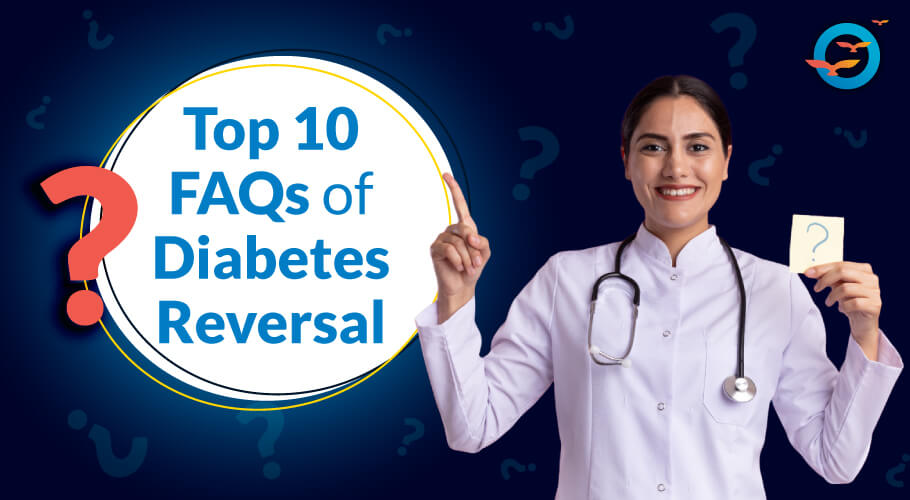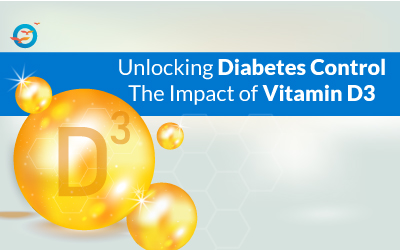Top 10 Frequently Asked Questions on Diabetes Reversal

Table of Contents
Diabetes mellitus also known as diabetes is a metabolic disease diagnosed by a sustained rise in blood sugar levels. It is classified into 2 main types;
1. Type 1 Diabetes
In type 1 diabetes the pancreas of the human body cannot make enough insulin.
2. Type 2 diabetes
In type 2 Diabetes insulin made in the body does not get an adequate response.
Most people around the world think, once a diabetic, always a diabetic, and that it cannot be reversed. Dr. Roy Taylor from the UK, was the first to put forth the idea that type 2 diabetes is caused by excess fat inside the liver and pancreas and this being a potentially reversible condition.
Building on Dr. Taylor’s research, Dr. Pramod Tripathi from India established Freedom from Diabetes in 2013 and since then, has been working in the field of Diabetes Reversal. So far, 11,500+ diabetics are free from diabetes medicines and insulin or both. FFD has shown to the world that Diabetes is reversible and sustainable reversible is a possibility.
Here is a list of Frequently Asked Questions (FAQs) in relation to Diabetes Reversal.
1. What is Diabetes Reversal?
The Oxford dictionary defines reversal as “ a change that it is the opposite of what it was". This is exactly what happens in diabetes reversal too. Your sugar levels and fat percent reduce muscle strength increases and above all there is a behavioral change that empowers one to sustain this new identity permanently.
2. Diabetes is genetic right? How can I reverse then?
This is a partial truth. Type 2 diabetes has a strong genetic link but genes are often dormant (not dominant). They activate only when diet, lifestyle, and stress switch them on. These genes can be switched off once you change your diet, lifestyle, and stress levels!
3. Can chronic diabetes be reversed?
Yes, chronic diabetes can be reversed, but the degree of reversal differs from person to person. Freedom from Diabetes has a huge data of people reversing their 20+ years of diabetes too.
4. Diabetics produce less insulin, don’t they? How can I reverse then?
Interestingly type 2 diabetics produce more insulin. Almost 95%+ type 2 diabetes have higher fasting insulin. The problem is not insulin production but INSULIN RESISTANCE (action of the insulin)! Reducing insulin resistance through lifestyle modification is seen to give good results in diabetes reversal.
5. If I have diabetes, can I do fasting?
It is a logical question. Fasting is the best way to reduce fat and as a byproduct insulin resistance too! Reducing weight is an important step in diabetes reversal. Fasting helps in reducing weight speedily.
6. How much time will it take for a complete diabetes reversal?
One needs to understand that reversal is not an overnight one-time event, it is a process. It happens by approaching the root causes in a step-by-step manner.
7. Is reversal sustainable?
Yes...If you go through proper steps and follow all the instructions phase-wise, you will attain sustainable reversal. A few year-round tips and tricks will ensure you can stay reversed.
8. Will I be able to eat my favorite foods after achieving my reversal?
Yes. You can enjoy your favorite food after attaining your reversal status albeit within limits!
9. Will I be able to manage my life without medicines after my reversal?
Yes. A reasonable percentage of participants at FFD do become reversed to a point where they are able to a live a life completely free of medications.
10. Will I be in a position to choose my favorite sport if I reverse and get fitness?
Yes. FFD's phases and Diabetes Reversal Program are structured in such a way that you become fitter and fitter and can easily opt for your favorite sport. In fact, FFD's program encourages people to select their athletic identity.
Conclusion
Type 2 diabetes can be reversed and a sustainable reversal is a reality. FFD's has a large number of people who have not only reversed their diabetes but achieved sustainable reversal!

